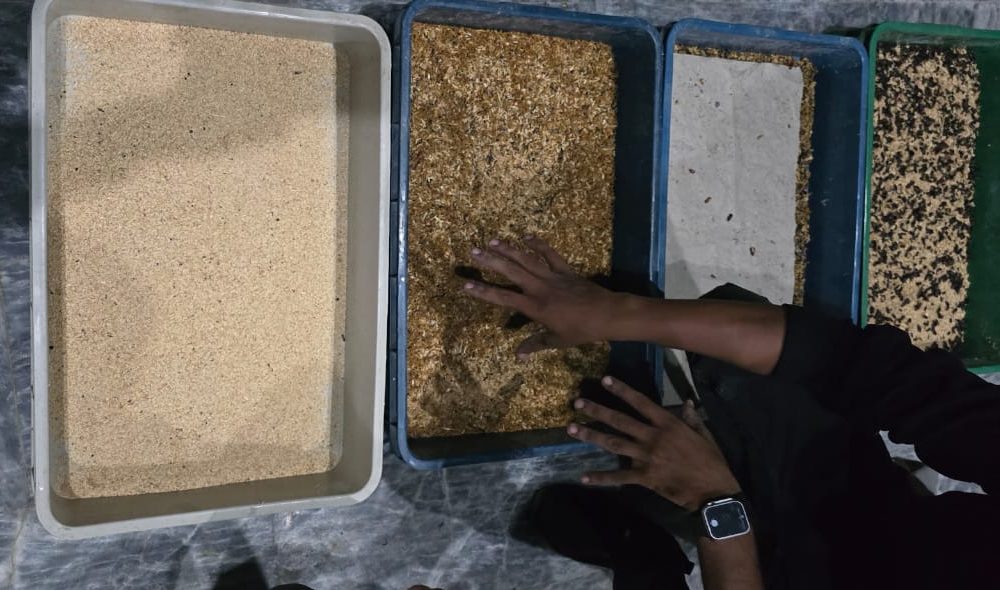Introduction:
Mealworm farming is a sustainable method of recycling organic waste and producing nutrient-rich frass (a natural fertilizer). Mealworms are highly efficient at converting organic matter, making them an excellent choice for environmentally friendly waste management and soil enhancement. In this blog, we’ll guide you through everything you need to know about starting a mealworm farm.
Key Sections:
- What is Mealworm Farming? – Mealworm farming, or insect farming, involves raising mealworms (the larval stage of the darkling beetle, Tenebrio molitor) to recycle food waste and produce valuable byproducts. Mealworms break down organic waste into frass, a nutrient-rich material similar to worm castings. Frass can be used as a natural fertilizer that improves soil health by adding essential nutrients and beneficial microbes, supporting sustainable gardening and farming.
- Choosing the Right Mealworm Species – The most commonly farmed mealworm species is Tenebrio molitor, due to its resilience and high efficiency in composting and growth. These mealworms thrive on a wide range of food, from vegetable scraps to grains, and are relatively low-maintenance. Selecting the right species ensures a faster, more sustainable yield and maximizes frass production.
- Setting Up Your Mealworm Farm – To set up a mealworm farm, you’ll need a container with adequate airflow and bedding, like oats or bran, which serves as both habitat and food for mealworms. Avoid exposing them to extreme temperatures, and ensure they have a dry environment with minimal moisture to prevent mold. Mealworms can be kept in drawers or multi-layered trays, allowing easy access to different life stages for optimized management.
- Feeding Your Mealworms – Mealworms thrive on a diet of grains (like oats or wheat bran), fruit and vegetable scraps, and occasional protein sources like powdered milk or yeast. Avoid acidic foods and excess moisture, which can create mold and bacteria in the habitat. Providing varied, nutrient-dense food promotes mealworm growth and enhances the quality of their frass, increasing its value as a natural fertilizer.
- The Life Cycle of Mealworms – Mealworms have a four-stage life cycle, each with specific requirements to promote healthy growth and yield:
- Egg Stage: Female darkling beetles lay tiny white eggs in the bedding. Eggs require moderate temperatures (around 77°F) and humidity to hatch within 4-19 days.
- Larva Stage (Mealworm): In this phase, mealworms are active feeders, growing as they consume organic material. They need a consistent dry environment and stable food supply. Mealworm larvae take several weeks to months to reach the next stage, depending on temperature and food quality.
- Pupa Stage: During this stage, mealworms stop feeding and curl into a pupal form, requiring a low-disturbance environment to develop. Stable temperatures and low moisture are essential, as this stage is sensitive to external stress.
- Adult Stage (Darkling Beetle): Mature darkling beetles emerge from the pupae and begin to reproduce, starting the cycle anew. Adults require warmth and access to food to produce a consistent egg supply, which sustains the mealworm farm.
- Harvesting Frass as Natural Fertilizer – Mealworm frass, produced mainly during the larval stage, is a valuable byproduct that serves as a high-quality organic fertilizer. Collect frass by sifting it from the bedding, and use it as a soil amendment that enhances nutrient content, promotes soil microbes, and boosts plant growth naturally.
- Troubleshooting Common Problems – Common issues include excess moisture, mold, and overcrowding, which can affect mealworm health. Ensuring proper ventilation, maintaining a dry environment, and controlling the population size will help keep your farm healthy and productive.
Conclusion:
Mealworm farming is a rewarding and sustainable practice that benefits your garden, reduces waste, and helps the environment. Start your mealworm farm today and join the green revolution!

